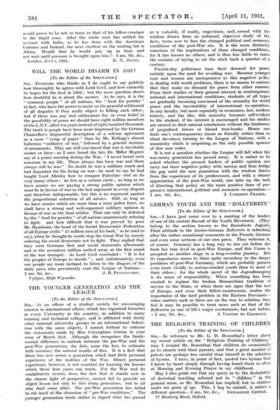GERMAN YOUTH AND THE " ZOLLVEREIN "
[To the Editor of the SPECTATOR.] SIR,—I have just come over to a meeting of the leaders of one of the central Buende of the Youth Movement. (They belong to the section known as the Buendische Jugend.) Their attitude to the Austro-German Zollverein is refreshing after the rather sensational comments in the French, German and even some sections of our own press. They welcome it, of course. Germany has a long way to rise yet before she finds her true level in post-War Europe, and this Union is accepted as another stage in a long-overdue journey. But its importance seems to them quite secondary to the deeper problems of post-War Germany, which are probably present even more vividly to serious-minded youth than to most of their elders : for the whole secret of the Jugendbewegung is its sense of responsibility. When something has been created to replace the broken Bismarckian tradition of service to the State, or when there are signs that the rest of Europe, and even their fellow-countrymen, realize the importance of the land problem in the Eastern Provinces— when matters such as these are on the way to solution, they feel it may be possible to treat news such as that of the Zollverein as one of life's major excitements, but not before.










































 Previous page
Previous page